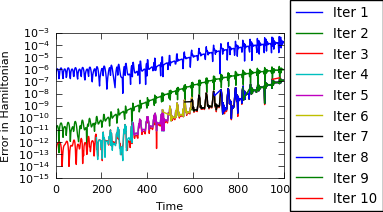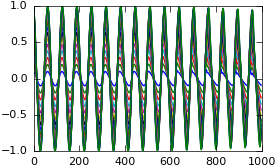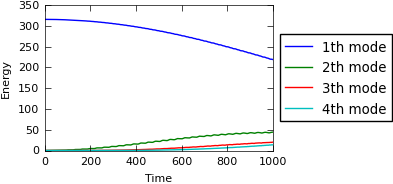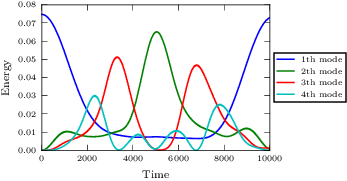Second-order Problems¶
In this project, we run several examples of the second-order Verlet-SDC integrator. This SDC variant is the core integrator for the Boris method, which we use e.g. in the 3rd tutorial.
Simple problems¶
We first test the integrator for some rather simple problems, namely the harmonic oscillator and the Henon-Heiles problem.
For both problems we make use of the hook hamiltonian_output to monitor the deviation from the exact Hamiltonian.
PFASST is run with 100 processors (virtually parallel) and the deviation from the initial Hamiltonian is shown.
Full code: pySDC/projects/Hamiltonian/simple_problems.py
import os
from collections import defaultdict
import dill
import numpy as np
import pySDC.helpers.plot_helper as plt_helper
from pySDC.helpers.stats_helper import get_sorted, filter_stats
from pySDC.implementations.controller_classes.controller_nonMPI import controller_nonMPI
from pySDC.implementations.problem_classes.HarmonicOscillator import harmonic_oscillator
from pySDC.implementations.problem_classes.HenonHeiles import henon_heiles
from pySDC.implementations.sweeper_classes.verlet import verlet
from pySDC.implementations.transfer_classes.TransferParticles_NoCoarse import particles_to_particles
from pySDC.projects.Hamiltonian.hamiltonian_output import hamiltonian_output
def setup_harmonic():
"""
Helper routine for setting up everything for the harmonic oscillator
Returns:
description (dict): description of the controller
controller_params (dict): controller parameters
"""
# initialize level parameters
level_params = dict()
level_params['restol'] = 1e-10
level_params['dt'] = 0.5
# initialize sweeper parameters
sweeper_params = dict()
sweeper_params['quad_type'] = 'LOBATTO'
sweeper_params['num_nodes'] = [5, 3]
sweeper_params['initial_guess'] = 'zero'
# initialize problem parameters for the Penning trap
problem_params = dict()
problem_params['k'] = 1.0
problem_params['phase'] = 0.0
problem_params['amp'] = 1.0
# initialize step parameters
step_params = dict()
step_params['maxiter'] = 50
# initialize controller parameters
controller_params = dict()
controller_params['hook_class'] = hamiltonian_output # specialized hook class for more statistics and output
controller_params['logger_level'] = 30
# Fill description dictionary for easy hierarchy creation
description = dict()
description['problem_class'] = harmonic_oscillator
description['problem_params'] = problem_params
description['sweeper_class'] = verlet
description['sweeper_params'] = sweeper_params
description['level_params'] = level_params
description['step_params'] = step_params
description['space_transfer_class'] = particles_to_particles
return description, controller_params
def setup_henonheiles():
"""
Helper routine for setting up everything for the Henon Heiles problem
Returns:
description (dict): description of the controller
controller_params (dict): controller parameters
"""
# initialize level parameters
level_params = dict()
level_params['restol'] = 1e-10
level_params['dt'] = 0.25
# initialize sweeper parameters
sweeper_params = dict()
sweeper_params['quad_type'] = 'LOBATTO'
sweeper_params['num_nodes'] = [5, 3]
sweeper_params['initial_guess'] = 'zero'
# initialize problem parameters for the Penning trap
problem_params = dict()
# initialize step parameters
step_params = dict()
step_params['maxiter'] = 50
# initialize controller parameters
controller_params = dict()
controller_params['hook_class'] = hamiltonian_output # specialized hook class for more statistics and output
controller_params['logger_level'] = 30
# Fill description dictionary for easy hierarchy creation
description = dict()
description['problem_class'] = henon_heiles
description['problem_params'] = problem_params
description['sweeper_class'] = verlet
description['sweeper_params'] = sweeper_params
description['level_params'] = level_params
description['step_params'] = step_params
description['space_transfer_class'] = particles_to_particles
return description, controller_params
def run_simulation(prob=None):
"""
Routine to run the simulation of a second order problem
Args:
prob (str): name of the problem
"""
# check what problem type we have and set up corresponding description and variables
if prob == 'harmonic':
description, controller_params = setup_harmonic()
# set time parameters
t0 = 0.0
Tend = 50.0
num_procs = 100
maxmeaniter = 6.5
elif prob == 'henonheiles':
description, controller_params = setup_henonheiles()
# set time parameters
t0 = 0.0
Tend = 25.0
num_procs = 100
maxmeaniter = 5.0
else:
raise NotImplementedError('Problem type not implemented, got %s' % prob)
# instantiate the controller
controller = controller_nonMPI(num_procs=num_procs, controller_params=controller_params, description=description)
# get initial values on finest level
P = controller.MS[0].levels[0].prob
uinit = P.u_exact(t=t0)
# call main function to get things done...
uend, stats = controller.run(u0=uinit, t0=t0, Tend=Tend)
# filter statistics by type (number of iterations)
iter_counts = get_sorted(stats, type='niter', sortby='time')
# compute and print statistics
# for item in iter_counts:
# out = 'Number of iterations for time %4.2f: %2i' % item
# print(out)
niters = np.array([item[1] for item in iter_counts])
out = ' Mean number of iterations: %4.2f' % np.mean(niters)
print(out)
out = ' Range of values for number of iterations: %2i ' % np.ptp(niters)
print(out)
out = ' Position of max/min number of iterations: %2i -- %2i' % (int(np.argmax(niters)), int(np.argmin(niters)))
print(out)
out = ' Std and var for number of iterations: %4.2f -- %4.2f' % (float(np.std(niters)), float(np.var(niters)))
print(out)
assert np.mean(niters) <= maxmeaniter, 'Mean number of iterations is too high, got %s' % np.mean(niters)
fname = 'data/' + prob + '.dat'
f = open(fname, 'wb')
dill.dump(stats, f)
f.close()
assert os.path.isfile(fname), 'Run for %s did not create stats file' % prob
def show_results(prob=None, cwd=''):
"""
Helper function to plot the error of the Hamiltonian
Args:
prob (str): name of the problem
cwd (str): current working directory
"""
# read in the dill data
f = open(cwd + 'data/' + prob + '.dat', 'rb')
stats = dill.load(f)
f.close()
# extract error in hamiltonian and prepare for plotting
extract_stats = filter_stats(stats, type='err_hamiltonian')
result = defaultdict(list)
for k, v in extract_stats.items():
result[k.iter].append((k.time, v))
for k, _ in result.items():
result[k] = sorted(result[k], key=lambda x: x[0])
plt_helper.mpl.style.use('classic')
plt_helper.setup_mpl()
plt_helper.newfig(textwidth=238.96, scale=0.89)
# Rearrange data for easy plotting
err_ham = 1
for k, v in result.items():
time = [item[0] for item in v]
ham = [item[1] for item in v]
err_ham = ham[-1]
plt_helper.plt.semilogy(time, ham, '-', lw=1, label='Iter ' + str(k))
assert err_ham < 3.7e-08, 'Error in the Hamiltonian is too large for %s, got %s' % (prob, err_ham)
plt_helper.plt.xlabel('Time')
plt_helper.plt.ylabel('Error in Hamiltonian')
plt_helper.plt.legend(loc='center left', bbox_to_anchor=(1, 0.5))
fname = 'data/' + prob + '_hamiltonian'
plt_helper.savefig(fname)
assert os.path.isfile(fname + '.pdf'), 'ERROR: plotting did not create PDF file'
# assert os.path.isfile(fname + '.pgf'), 'ERROR: plotting did not create PGF file'
assert os.path.isfile(fname + '.png'), 'ERROR: plotting did not create PNG file'
def main():
prob = 'harmonic'
run_simulation(prob)
show_results(prob)
prob = 'henonheiles'
run_simulation(prob)
show_results(prob)
if __name__ == "__main__":
main()
Results:
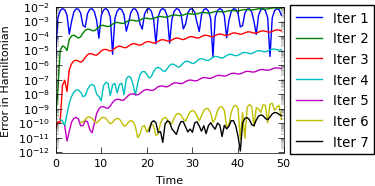
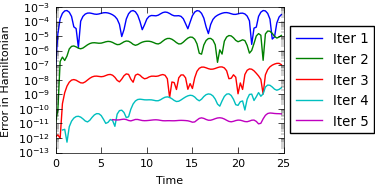
Solar system problem¶
In this slightly more complex setup we simulate the movement of planets in the solar system. The acceleration due to gravitational forces are computed using a simple N^2 solver. We can use two different setups:
OuterSolarSystemproblem class: only the six outer planets are simulated, namely the Sun (which in its mass contains the inner planets), Jupiter, Saturn, Uranus, Neptune and Pluto.FullSolarSystemproblem class: all planets are simulated, with earth and moon combined
Coarsening can be done using only the sun for computing the acceleration. Note how PFASST works very well for the outer solar system problem, but not so well for the full solar system problem. Here, over 15 iterations are required in the mean, while SDC and MLSDC require only about 5 per step.
Full code: pySDC/projects/Hamiltonian/solar_system.py
import os
from collections import defaultdict
from mpl_toolkits.mplot3d import Axes3D
import dill
import numpy as np
import pySDC.helpers.plot_helper as plt_helper
from pySDC.helpers.stats_helper import get_sorted, filter_stats
from pySDC.implementations.controller_classes.controller_nonMPI import controller_nonMPI
from pySDC.implementations.problem_classes.FullSolarSystem import full_solar_system
from pySDC.implementations.problem_classes.OuterSolarSystem import outer_solar_system
from pySDC.implementations.sweeper_classes.verlet import verlet
from pySDC.implementations.transfer_classes.TransferParticles_NoCoarse import particles_to_particles
from pySDC.projects.Hamiltonian.hamiltonian_output import hamiltonian_output
def setup_outer_solar_system():
"""
Helper routine for setting up everything for the outer solar system problem
Returns:
description (dict): description of the controller
controller_params (dict): controller parameters
"""
# initialize level parameters
level_params = dict()
level_params['restol'] = 1e-10
level_params['dt'] = 100.0
# initialize sweeper parameters
sweeper_params = dict()
sweeper_params['quad_type'] = 'LOBATTO'
sweeper_params['num_nodes'] = [5, 3]
sweeper_params['initial_guess'] = 'spread'
# initialize problem parameters for the Penning trap
problem_params = dict()
problem_params['sun_only'] = [False, True]
# initialize step parameters
step_params = dict()
step_params['maxiter'] = 50
# initialize controller parameters
controller_params = dict()
controller_params['hook_class'] = hamiltonian_output # specialized hook class for more statistics and output
controller_params['logger_level'] = 30
# Fill description dictionary for easy hierarchy creation
description = dict()
description['problem_class'] = outer_solar_system
description['problem_params'] = problem_params
description['sweeper_class'] = verlet
description['sweeper_params'] = sweeper_params
description['level_params'] = level_params
description['step_params'] = step_params
description['space_transfer_class'] = particles_to_particles
return description, controller_params
def setup_full_solar_system():
"""
Helper routine for setting up everything for the full solar system problem
Returns:
description (dict): description of the controller
controller_params (dict): controller parameters
"""
# initialize level parameters
level_params = dict()
level_params['restol'] = 1e-10
level_params['dt'] = 10.0
# initialize sweeper parameters
sweeper_params = dict()
sweeper_params['quad_type'] = 'LOBATTO'
sweeper_params['num_nodes'] = [5, 3]
sweeper_params['initial_guess'] = 'spread'
# initialize problem parameters for the Penning trap
problem_params = dict()
problem_params['sun_only'] = [False, True]
# initialize step parameters
step_params = dict()
step_params['maxiter'] = 50
# initialize controller parameters
controller_params = dict()
controller_params['hook_class'] = hamiltonian_output # specialized hook class for more statistics and output
controller_params['logger_level'] = 30
# Fill description dictionary for easy hierarchy creation
description = dict()
description['problem_class'] = full_solar_system
description['problem_params'] = problem_params
description['sweeper_class'] = verlet
description['sweeper_params'] = sweeper_params
description['level_params'] = level_params
description['step_params'] = step_params
description['space_transfer_class'] = particles_to_particles
return description, controller_params
def run_simulation(prob=None):
"""
Routine to run the simulation of a second order problem
Args:
prob (str): name of the problem
"""
if prob == 'outer_solar_system':
description, controller_params = setup_outer_solar_system()
# set time parameters
t0 = 0.0
Tend = 10000.0
num_procs = 100
maxmeaniter = 6.0
elif prob == 'full_solar_system':
description, controller_params = setup_full_solar_system()
# set time parameters
t0 = 0.0
Tend = 1000.0
num_procs = 100
maxmeaniter = 19.0
else:
raise NotImplementedError('Problem type not implemented, got %s' % prob)
f = open('data/' + prob + '_out.txt', 'w')
out = 'Running ' + prob + ' problem with %s processors...' % num_procs
f.write(out + '\n')
print(out)
# instantiate the controller
controller = controller_nonMPI(num_procs=num_procs, controller_params=controller_params, description=description)
# get initial values on finest level
P = controller.MS[0].levels[0].prob
uinit = P.u_exact(t=t0)
# call main function to get things done...
uend, stats = controller.run(u0=uinit, t0=t0, Tend=Tend)
# filter statistics by type (number of iterations)
iter_counts = get_sorted(stats, type='niter', sortby='time')
# compute and print statistics
# for item in iter_counts:
# out = 'Number of iterations for time %4.2f: %2i' % item
# f.write(out)
# print(out)
niters = np.array([item[1] for item in iter_counts])
out = ' Mean number of iterations: %4.2f' % np.mean(niters)
f.write(out + '\n')
print(out)
out = ' Range of values for number of iterations: %2i ' % np.ptp(niters)
f.write(out + '\n')
print(out)
out = ' Position of max/min number of iterations: %2i -- %2i' % (int(np.argmax(niters)), int(np.argmin(niters)))
f.write(out + '\n')
print(out)
out = ' Std and var for number of iterations: %4.2f -- %4.2f' % (float(np.std(niters)), float(np.var(niters)))
f.write(out + '\n')
print(out)
f.close()
assert np.mean(niters) <= maxmeaniter, 'Mean number of iterations is too high, got %s' % np.mean(niters)
fname = 'data/' + prob + '.dat'
f = open(fname, 'wb')
dill.dump(stats, f)
f.close()
assert os.path.isfile(fname), 'Run for %s did not create stats file' % prob
def show_results(prob=None, cwd=''):
"""
Helper function to plot the error of the Hamiltonian
Args:
prob (str): name of the problem
cwd (str): current working directory
"""
# read in the dill data
f = open(cwd + 'data/' + prob + '.dat', 'rb')
stats = dill.load(f)
f.close()
plt_helper.mpl.style.use('classic')
plt_helper.setup_mpl()
# extract error in hamiltonian and prepare for plotting
extract_stats = filter_stats(stats, type='err_hamiltonian')
result = defaultdict(list)
for k, v in extract_stats.items():
result[k.iter].append((k.time, v))
for k, _ in result.items():
result[k] = sorted(result[k], key=lambda x: x[0])
plt_helper.newfig(textwidth=238.96, scale=0.89)
# Rearrange data for easy plotting
err_ham = 1
for k, v in result.items():
time = [item[0] for item in v]
ham = [item[1] for item in v]
err_ham = ham[-1]
plt_helper.plt.semilogy(time, ham, '-', lw=1, label='Iter ' + str(k))
assert err_ham < 2.4e-14, 'Error in the Hamiltonian is too large for %s, got %s' % (prob, err_ham)
plt_helper.plt.xlabel('Time')
plt_helper.plt.ylabel('Error in Hamiltonian')
plt_helper.plt.legend(loc='center left', bbox_to_anchor=(1, 0.5))
fname = 'data/' + prob + '_hamiltonian'
plt_helper.savefig(fname)
assert os.path.isfile(fname + '.pdf'), 'ERROR: plotting did not create PDF file'
# assert os.path.isfile(fname + '.pgf'), 'ERROR: plotting did not create PGF file'
assert os.path.isfile(fname + '.png'), 'ERROR: plotting did not create PNG file'
# extract positions and prepare for plotting
result = get_sorted(stats, type='position', sortby='time')
fig = plt_helper.plt.figure()
ax = fig.add_subplot(111, projection='3d')
# Rearrange data for easy plotting
nparts = len(result[1][1][0])
ndim = len(result[1][1])
nsteps = len(result)
pos = np.zeros((nparts, ndim, nsteps))
for idx, item in enumerate(result):
for n in range(nparts):
for m in range(ndim):
pos[n, m, idx] = item[1][m][n]
for n in range(nparts):
if ndim == 2:
ax.plot(pos[n, 0, :], pos[n, 1, :])
elif ndim == 3:
ax.plot(pos[n, 0, :], pos[n, 1, :], pos[n, 2, :])
else:
raise NotImplementedError('Wrong number of dimensions for plotting, got %s' % ndim)
fname = 'data/' + prob + '_positions'
plt_helper.savefig(fname)
assert os.path.isfile(fname + '.pdf'), 'ERROR: plotting did not create PDF file'
# assert os.path.isfile(fname + '.pgf'), 'ERROR: plotting did not create PGF file'
assert os.path.isfile(fname + '.png'), 'ERROR: plotting did not create PNG file'
def main():
prob = 'outer_solar_system'
run_simulation(prob)
show_results(prob)
prob = 'full_solar_system'
run_simulation(prob)
show_results(prob)
if __name__ == "__main__":
main()
Results:
Running outer_solar_system problem with 100 processors...
Mean number of iterations: 5.06
Range of values for number of iterations: 4
Position of max/min number of iterations: 74 -- 0
Std and var for number of iterations: 0.75 -- 0.56
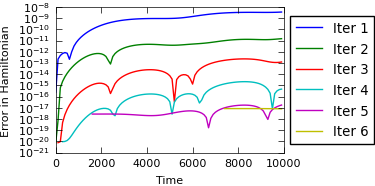
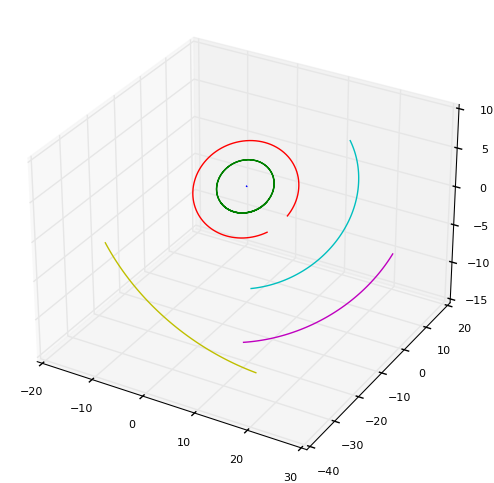
Running full_solar_system problem with 100 processors...
Mean number of iterations: 18.02
Range of values for number of iterations: 24
Position of max/min number of iterations: 96 -- 0
Std and var for number of iterations: 6.37 -- 40.54
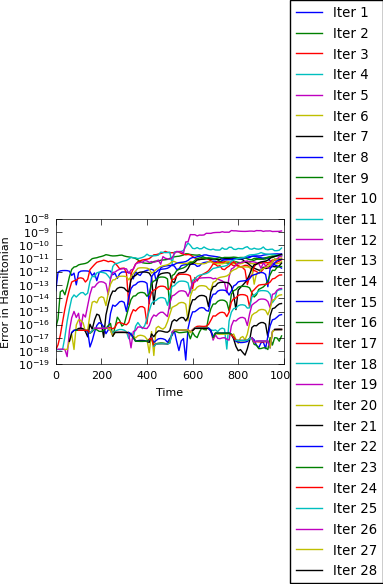
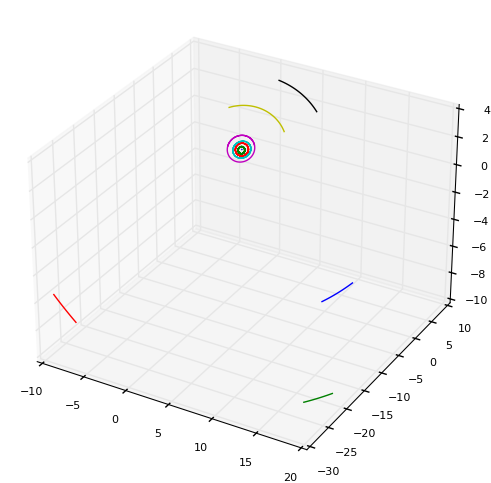
Fermi-Pasta-Ulam-Tsingou problem¶
This is the famous FPUT problem, one of the first numerical simulation done in physics.
The basis for this setup can be found here and we implement this in the FermiPastaUlamTsingou problem class.
Due to time limitations in the CI environment, we only run the first few steps and not until Tend=10000.
We refer to the right-most picture below for the full run.
Note that we run MLSDC here, since PFASST does not seem to converge easily.
Full code: pySDC/projects/Hamiltonian/fput.py
import os
from collections import defaultdict
import dill
import numpy as np
import pySDC.helpers.plot_helper as plt_helper
from pySDC.helpers.stats_helper import get_sorted, filter_stats
from pySDC.implementations.controller_classes.controller_nonMPI import controller_nonMPI
from pySDC.implementations.problem_classes.FermiPastaUlamTsingou import fermi_pasta_ulam_tsingou
from pySDC.implementations.sweeper_classes.verlet import verlet
from pySDC.implementations.transfer_classes.TransferParticles_NoCoarse import particles_to_particles
from pySDC.projects.Hamiltonian.hamiltonian_and_energy_output import hamiltonian_and_energy_output
def setup_fput():
"""
Helper routine for setting up everything for the Fermi-Pasta-Ulam-Tsingou problem
Returns:
description (dict): description of the controller
controller_params (dict): controller parameters
"""
# initialize level parameters
level_params = dict()
level_params['restol'] = 1e-12
level_params['dt'] = 2.0
# initialize sweeper parameters
sweeper_params = dict()
sweeper_params['quad_type'] = 'LOBATTO'
sweeper_params['num_nodes'] = [5, 3]
sweeper_params['initial_guess'] = 'zero'
# initialize problem parameters for the Penning trap
problem_params = dict()
problem_params['npart'] = 2048
problem_params['alpha'] = 0.25
problem_params['k'] = 1.0
problem_params['energy_modes'] = [[1, 2, 3, 4]]
# initialize step parameters
step_params = dict()
step_params['maxiter'] = 50
# initialize controller parameters
controller_params = dict()
controller_params['hook_class'] = hamiltonian_and_energy_output
controller_params['logger_level'] = 30
# Fill description dictionary for easy hierarchy creation
description = dict()
description['problem_class'] = fermi_pasta_ulam_tsingou
description['problem_params'] = problem_params
description['sweeper_class'] = verlet
description['sweeper_params'] = sweeper_params
description['level_params'] = level_params
description['step_params'] = step_params
description['space_transfer_class'] = particles_to_particles
return description, controller_params
def run_simulation():
"""
Routine to run the simulation of a second order problem
"""
description, controller_params = setup_fput()
# set time parameters
t0 = 0.0
# set this to 10000 to reproduce the picture in
# http://www.scholarpedia.org/article/Fermi-Pasta-Ulam_nonlinear_lattice_oscillations
Tend = 1000.0
num_procs = 1
f = open('data/fput_out.txt', 'w')
out = 'Running fput problem with %s processors...' % num_procs
f.write(out + '\n')
print(out)
# instantiate the controller
controller = controller_nonMPI(num_procs=num_procs, controller_params=controller_params, description=description)
# get initial values on finest level
P = controller.MS[0].levels[0].prob
uinit = P.u_exact(t=t0)
# call main function to get things done...
uend, stats = controller.run(u0=uinit, t0=t0, Tend=Tend)
# filter statistics by type (number of iterations)
iter_counts = get_sorted(stats, type='niter', sortby='time')
# compute and print statistics
# for item in iter_counts:
# out = 'Number of iterations for time %4.2f: %2i' % item
# f.write(out + '\n')
# print(out)
niters = np.array([item[1] for item in iter_counts])
out = ' Mean number of iterations: %4.2f' % np.mean(niters)
f.write(out + '\n')
print(out)
out = ' Range of values for number of iterations: %2i ' % np.ptp(niters)
f.write(out + '\n')
print(out)
out = ' Position of max/min number of iterations: %2i -- %2i' % (int(np.argmax(niters)), int(np.argmin(niters)))
f.write(out + '\n')
print(out)
out = ' Std and var for number of iterations: %4.2f -- %4.2f' % (float(np.std(niters)), float(np.var(niters)))
f.write(out + '\n')
print(out)
# get runtime
timing_run = get_sorted(stats, type='timing_run', sortby='time')[0][1]
out = '... took %6.4f seconds to run this.' % timing_run
f.write(out + '\n')
print(out)
f.close()
# assert np.mean(niters) <= 3.46, 'Mean number of iterations is too high, got %s' % np.mean(niters)
fname = 'data/fput.dat'
f = open(fname, 'wb')
dill.dump(stats, f)
f.close()
assert os.path.isfile(fname), 'Run for %s did not create stats file'
def show_results(cwd=''):
"""
Helper function to plot the error of the Hamiltonian
Args:
cwd (str): current working directory
"""
# read in the dill data
f = open(cwd + 'data/fput.dat', 'rb')
stats = dill.load(f)
f.close()
plt_helper.mpl.style.use('classic')
plt_helper.setup_mpl()
# HAMILTONIAN PLOTTING #
# extract error in hamiltonian and prepare for plotting
extract_stats = filter_stats(stats, type='err_hamiltonian')
result = defaultdict(list)
for k, v in extract_stats.items():
result[k.iter].append((k.time, v))
for k, _ in result.items():
result[k] = sorted(result[k], key=lambda x: x[0])
plt_helper.newfig(textwidth=238.96, scale=0.89)
# Rearrange data for easy plotting
err_ham = 1
for k, v in result.items():
time = [item[0] for item in v]
ham = [item[1] for item in v]
err_ham = ham[-1]
plt_helper.plt.semilogy(time, ham, '-', lw=1, label='Iter ' + str(k))
print(err_ham)
# assert err_ham < 6E-10, 'Error in the Hamiltonian is too large, got %s' % err_ham
plt_helper.plt.xlabel('Time')
plt_helper.plt.ylabel('Error in Hamiltonian')
plt_helper.plt.legend(loc='center left', bbox_to_anchor=(1, 0.5))
fname = 'data/fput_hamiltonian'
plt_helper.savefig(fname)
assert os.path.isfile(fname + '.pdf'), 'ERROR: plotting did not create PDF file'
# assert os.path.isfile(fname + '.pgf'), 'ERROR: plotting did not create PGF file'
assert os.path.isfile(fname + '.png'), 'ERROR: plotting did not create PNG file'
# ENERGY PLOTTING #
# extract error in hamiltonian and prepare for plotting
result = get_sorted(stats, type='energy_step', sortby='time')
plt_helper.newfig(textwidth=238.96, scale=0.89)
# Rearrange data for easy plotting
for mode in result[0][1].keys():
time = [item[0] for item in result]
energy = [item[1][mode] for item in result]
plt_helper.plt.plot(time, energy, label=str(mode) + 'th mode')
plt_helper.plt.xlabel('Time')
plt_helper.plt.ylabel('Energy')
plt_helper.plt.legend(loc='center left', bbox_to_anchor=(1, 0.5))
fname = 'data/fput_energy'
plt_helper.savefig(fname)
assert os.path.isfile(fname + '.pdf'), 'ERROR: plotting did not create PDF file'
# assert os.path.isfile(fname + '.pgf'), 'ERROR: plotting did not create PGF file'
assert os.path.isfile(fname + '.png'), 'ERROR: plotting did not create PNG file'
# POSITION PLOTTING #
# extract positions and prepare for plotting
result = get_sorted(stats, type='position', sortby='time')
plt_helper.newfig(textwidth=238.96, scale=0.89)
# Rearrange data for easy plotting
nparts = len(result[0][1])
nsteps = len(result)
pos = np.zeros((nparts, nsteps))
time = np.zeros(nsteps)
for idx, item in enumerate(result):
time[idx] = item[0]
for n in range(nparts):
pos[n, idx] = item[1][n]
for n in range(min(nparts, 16)):
plt_helper.plt.plot(time, pos[n, :])
fname = 'data/fput_positions'
plt_helper.savefig(fname)
assert os.path.isfile(fname + '.pdf'), 'ERROR: plotting did not create PDF file'
# assert os.path.isfile(fname + '.pgf'), 'ERROR: plotting did not create PGF file'
assert os.path.isfile(fname + '.png'), 'ERROR: plotting did not create PNG file'
def main():
run_simulation()
show_results()
if __name__ == "__main__":
main()
Results:
Running fput problem with 1 processors...
Mean number of iterations: 5.83
Range of values for number of iterations: 7
Position of max/min number of iterations: 475 -- 0
Std and var for number of iterations: 2.10 -- 4.42
... took 37.6863 seconds to run this.
